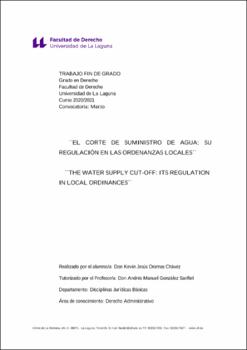El corte de suministro de agua: su regulación en las ordenanzas locales
Fecha
2021Resumen
Este trabajo plantea desde el punto de vista del usuario, el servicio de
abastecimiento de agua contemplado en el art.26 de la Ley de Bases del
Régimen Local. En este sentido, abarca los motivos de suspensión del
suministro, así como el marco jurídico de su procedimiento, analizado desde
el punto de vista de la Administración Pública competente, la entidad
privada suministradora (en su caso) y el abonado que recibe su prestación.
Para ello se van a tratar las herramientas de las que dispone el ciudadano, la
autorización de la Administración Pública y los requisitos legales que
marcan los pasos de la empresa suministradora en su camino al corte. No
obstante, en el desarrollo de estos temas, encontrarán supuestos
excepcionales frente al desarrollo normal del servicio, así como
adaptaciones de la norma que permitan abordar estos supuestos con la
mayor equidad y coherencia.
Mientras se desenvuelve su contenido, se contempla la teoría jurídica del
servicio junto con la realidad práctica del mismo que requiere una
comprensión de los medios destinados a su prestación, así como la
explicitud con la que se materializa el cauce planteado para su desarrollo. This work raises from the user’s point of view, the water supply service
contemplated in art.26 of the Law of Bases of the Local Regime. In this
sense, it covers the reasons for the suspension of supply, as well as the legal
framework of its procedure, analysed from the point of view of the
competent public administration, the private supplier entity (if any) and the
subscriber receiving its service. For this purpose, the tools available to the
citizen, the authorization of the Public Administration and the legal
requirements that mark the steps of the supplier company on its way to the
court will be discussed. However, in the development of these issues, they
will find exceptional assumptions regarding the normal development of the
service, as well as adaptations of the norm that allow to address these
assumptions with the greatest fairness and coherence.
While its content unfolds, it contemplates the legal theory of the service
together with the practical reality of the service that requires an
understanding of the means destined to its provision, as well as the
explicitness with, which the proposed channel for its development
materializes.





